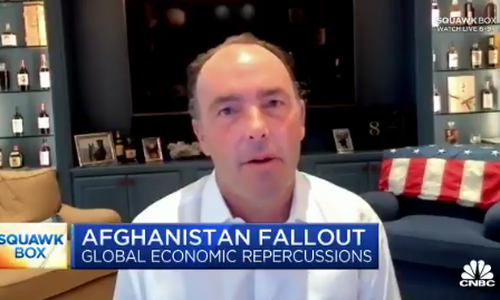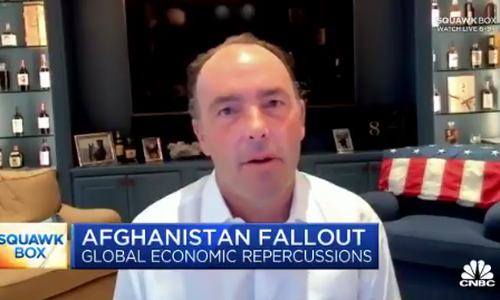
By Tyler Durden
Kyle Bass is warning that China – which announced it was ready to deepen “friendly and cooperative” relations with the Taliban mere hours after they toppled the Afghan government – is going to “move in under security and diplomatic guise” to pilfer Afghanistan’s trillions in mineral deposits.
“On the basis of fully respecting the sovereignty of Afghanistan and the will of all factions in the country, China has maintained contact and communication with the Afghan Taliban and played a constructive role in promoting the political settlement of the Afghan issue,” said spokeswoman Hua Chunying at a press conference on Monday.
And recall that Beijing officials hosted Taliban leaders three weeks ago, as the Biden administration embarked on its “hasty withdrawal” from Afghanistan that led to its ‘hasty’ collapse.
#Taliban leader visit in #China
More to come… pic.twitter.com/HJPx1XTDZR— Serena Dong (@theserenadong) July 28, 2021
Appearing on CNBC‘s Squawk Box, the legendary investor and founder of Hayman Capital said “Afghanistan is plagued with the curse of plenty. They have, we think, upwards of $3T worth of minerals. The US Pentagon believes one province … has the largest lithium deposit in the world,” adding “China will move in under security and diplomatic guise.”
"Afghanistan is plagued with the curse of plenty. They have, we think, upwards of $3T worth of minerals. The US Pentagon believes one province … has the largest lithium deposit in the world," says @Jkylebass. "China will move in under security and diplomatic guise." pic.twitter.com/RuOoUufSHR
— Squawk Box (@SquawkCNBC) August 17, 2021
Bass, a history buff, expanded in a brief Twitter thread – noting the story of one of the “biggest US Special Forces firefights of all-time” which occurred in the Shok valley – all to remove a terrorist warlord who was building his empire through the operation of illegal rare-earth mines.
“Be sure to look up this vicious battle as 15 Green Berets and 65 Afghan commandos fought an ambush of over 250 terrorists and not one single American Flag of United States died that day in a 6-hour firefight that endured 70 danger-close bombings of 1000lb JDAMS. While some of our bravest won’t [h]ave their arms or legs grown back, they fought for peace, stability, and the long-term economic prosperity of Afghanistan. With China moving in to rape the countryside and the people of Afghanistan, that dream will never be realized.”
One of the biggest US Special Forces firefights of all-time was in Afghanistan in the Shok Valley. The fight was to remove a terrorist warlord who was running illegal rare earth mines to build his own empire in the province. @JoeSquawk @andrewrsorkin @BeckyQuick @CNBC https://t.co/Ouj5zwFGJA
— ??Kyle Bass?? (@Jkylebass) August 17, 2021
According to Hua, the Taliban has “on multiple occasions” said that it “looks forward to China’s participation in Afghanistan’s reconstruction and development.”
“We are ready to continue to develop good-neighborliness and friendly cooperation with Afghanistan and play a constructive role in Afghanistan’s peace and reconstruction,” Hua added.
Such nice partners…
Biometric data apparently has been seized by Taliban of the Afghans that helped US last 20 years allowing for execution lists and a swift round up.
Isn’t technology wonderful! https://t.co/zJIlMM1OI8
— Ed ☯️ The Obsolete Man…a Free Thinker (@DowdEdward) August 17, 2021
Bass wasn’t the only one to point out China’s windfall.
“…there should be pressure on China if they are going to do alliances with the Taliban in order to generate economic aid for them — that they do it on international terms,” said Shamaila Khan, director of emerging market debt at Alliance Bernstein, during a Tuesday appearance on CNBC, adding that Taliban insurgents will now control resources that are a “very dangerous proposition for the world.”
“It should be an international initiative to make sure that if any country is agreeing to exploit its minerals on behalf of the Taliban, to only do it under strict humanitarian conditions where human rights, and rights for women are preserved in the situation,” she added.
As we noted in 2010, nearly $1 trillion in untapped mineral deposits were identified in Afghanistan, far more than any previously known reserves – and a figure which has risen in recent years to more than $3 trillion.
Rare earth metals in Afghanistan were estimated to be worth between $1 trillion and $3 trillion in 2020, according to a report in news magazine The Diplomat, citing Ahmad Shah Katawazai, a former diplomat at the Afghan Embassy in Washington D.C. A report by American news organization The Hill earlier this year put the value at about $3 trillion.
…
Afghanistan has rare earth elements such as lanthanum, cerium, neodymium, and veins of aluminum, gold, silver, zinc, mercury, and lithium, according to Katawazai. Rare earths are used in everything from electronics to electric vehicles, and satellites and aircraft.
In 2017, just-fled Afghan President Ashraf Ghani was in talks with Germany about lithium deposits in Helmand province, which could be mined by European countries to make batteries for smart phones, electric vehicles and other technology.
Meanwhile, in January of this year the Afghan government terminated oil and gas contracts with China, and sought to renegotiate terms of a massive $100 million mining concession because Beijing established a spy ring within the country, according to Foreign Policy.
Afghan government officials said that the country has terminated oil and gas contracts with China and is seeking to renegotiate the terms of a massive mining concession that has been nearly dormant since it was inked by China more than a decade ago.
The Afghan officials said they busted an alleged Chinese espionage ring operating in Kabul to hunt down Uighur Muslims with the help of the Haqqani network, a terrorist outfit linked to the Taliban. A senior security official said the ring had been operating for six or seven years. Afghan authorities have cooperated with China in the past on the detention and deportation of Uighurs suspected of terrorist activity, but officials said they were shocked at China’s duplicity.
…
The arrest has prompted Kabul, which is seeking to put its economy in order as it faces an uncertain future with the unfolding peace process, to use the incident as “leverage” against Beijing, one official said, especially in terms of renegotiating multimillion-dollar mining concessions. -FP
So, it should come as no surprise that China – which dominates the rare earths markets globally (producing 120,000 metric tons or 70% of total rare earths in 2018 per CNBC) is more than a little excited to ‘have their way’ with Afghanistan’s profitable deposits.
U.S. reserves also pale in comparison to China. The U.S. has a total of 1.4 million metric tons of reserves, versus 44 million metric tons of reserves in China.
China used rare earths as a threat during its trade war with the U.S. in 2019, when Beijing threatened to cut off supplies to the U.S. Rare earth minerals are commonly used in high-tech devices, automobiles, clean energy and defense.
The U.S. was heavily dependent on China for rare earths in 2019, when the Asian country was exporting 80% of U.S. needs, according to the U.S. Geological Survey. –CNBC
And let’s not forget Afghanistan’s lucrative CIA-enabled poppy trade. As MintPressNews noted in June, “Last year saw Afghan opium poppy cultivation grow by over a third while counter-narcotics operations dropped off a cliff. The country is said to be the source of over 90% of all the world’s illicit opium, from which heroin and other opioids are made. More land is under cultivation for opium in Afghanistan than is used for coca production across all of Latin America, with the creation of the drug said to directly employ around half a million people.”
As Pepe Escobar wrote in The Asia Times last month, “Taliban spokesperson Suhail Shaheen has been very consistent: the Taliban regard China as a “friend” to Afghanistan and are eager to have Beijing investing in reconstruction work “as soon as possible.“
Looks like that’s going to happen sooner than anyone thought.





